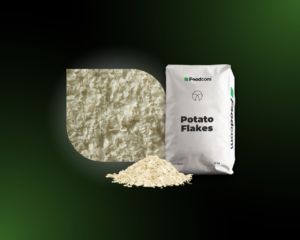- Key plant-based ingredients such as modified starch, potato flakes and shea butter are evolving in response to changing demand and supply chain challenges.
- Producers are focusing on sustainable and strategic sourcing to meet growing consumer expectations and quality requirements.
- The grain market is under pressure: in the US, corn and soybean prices are falling below profitability levels, while France is struggling with a wheat oversupply.
- Turkey is implementing wide-ranging agricultural reforms, focusing on effective water management, climate resilience and improving the sector’s competitiveness.
Changing dynamics, rising expectations – plant-based ingredients are evolving rapidly. From shea butter to modified starches, shifts in demand, the complexity of sourcing raw materials and regional performance are shaping the competitive landscape. In this issue, we analyse the key raw materials that are hitting the headlines, highlighting growth trends, bottlenecks and signals for strategic sourcing. Whether motivated by sustainability goals or performance needs, the pressure to maintain a competitive edge has never been greater.
Modified waxy corn starch
Modified waxy maize starch offers high functionality in a wide range of food and industrial applications, particularly where thermal stability, viscosity control and clean appearance are required. It plays a key role in processed sauces, dairy substitutes, ready meals and meat products, and is also used in the pharmaceutical and paper markets.
In regions such as South America and North Africa, demand continues to grow as consumption of prepared foods increases and local processing capacity improves. While fluctuations in maize prices and raw material availability remain a concern, investments in regional production and recipe innovation are helping producers to reduce risk and improve product yields.
Organic potato flakes
Demand for organic potato flakes is growing steadily, driven by consumer interest in pure and plant-based products. These flakes are increasingly used in snacks, soups, bakery fillings and instant meals due to their convenience and minimal processing. Leading the way are North American and European brands that are incorporating organic potato ingredients into both premium and mainstream product lines.
However, the category faces the typical challenges associated with organic supply chains: lower yields, higher production costs and more limited availability compared to conventional flakes. However, the market outlook remains positive, supported by good retail performance and a consumer base willing to pay more for certified organic products.
Shea butter
Shea butter continues to perform well in the personal care and food sectors, with organic and unrefined products showing the greatest momentum. Its multifunctional profile, natural origin and compliance with ethical sourcing trends have made it a preferred ingredient in pure product formulations. Demand is being driven by European and North American markets, especially where sustainability and transparency are at the forefront.
Despite this growth, producers and buyers continue to face challenges. Lead times from West African regions often exceed 24 months and inconsistent product quality remains a concern, particularly for non-certified supplies. As a result, sourcing strategies are now focusing on traceability, certification and partnerships with suppliers to ensure quality and continuity of supply.
What else?
USA
Chicago corn and soybean futures prices have fallen to their lowest level since 2006 after adjusting for inflation, driven by expectations of a good US harvest and increasing competition from Brazil. Corn prices have fallen by more than 30% since mid-2022, and soybean prices are also under pressure despite declining stocks. Farmers are facing increasing financial difficulties as production costs remain high and current market prices fall well below the levels needed for profitable insurance. The downward trend reflects broader concerns about oversupply and weaker global demand.
France
Soft wheat stocks in France are expected to reach their highest level since 2005 due to a significant recovery in domestic production combined with only a moderate improvement in export demand. Despite forecasts of a surge in wheat shipments to non-EU countries, production growth is likely to outstrip these gains, resulting in a significant increase in unsold wheat stocks by the end of the 2024/25 season. Analysts attribute this situation to a combination of favourable weather conditions, which have boosted yields, and limited demand from traditional export markets, which continue to face strong competition from Black Sea suppliers. The surplus could put additional pressure on wheat prices in France and raise farmers’ concerns about storage capacity and financial stability in the coming marketing year.
Turkey
In April 2025, Turkey presented its agricultural priorities for the next five years at a major national council meeting attended by government representatives, industry experts and private stakeholders. The country adopted 86 new measures to modernise the agricultural sector, increase resilience to climate change and strengthen global competitiveness. A key element of the plan is a new production planning system to help farmers use water resources more efficiently. The initiatives also aim to improve the country’s food security and support sustainable rural development.

![Prices under pressure, yields in surplus – the plant market in the face of global imbalance [77th Edition of the PLANT-BASED Newsletter] Prices under pressure, yields in surplus – the plant market in the face of global imbalance [77th Edition of the PLANT-BASED Newsletter]](https://foodcom.pl/wp-content/uploads/2024/06/Foodcom_SA_Plant-Based_Newsletter_9-1520x760.jpg)


![Trends in the market for plant-based products and the hidden risks behind stable prices [76th Edition of the PLANT-BASED Newsletter] Trends in the market for plant-based products and the hidden risks behind stable prices [76th Edition of the PLANT-BASED Newsletter]](https://foodcom.pl/wp-content/uploads/2023/08/Foodcom_Plant-Based_Newsletter-600x300.jpg)
![From hazelnuts to chia – what’s driving the plant-based market now? [75th Edition of the PLANT-BASED Newsletter] From hazelnuts to chia – what’s driving the plant-based market now? [75th Edition of the PLANT-BASED Newsletter]](https://foodcom.pl/wp-content/uploads/2023/08/Foodcom_Newsletter_Plant-Based-600x300.jpg)
![Storm on the plant-based market – latest disruptions and outlook [74th Edition of the PLANT-BASED Newsletter] Storm on the plant-based market – latest disruptions and outlook [74th Edition of the PLANT-BASED Newsletter]](https://foodcom.pl/wp-content/uploads/2023/08/Foodcom_SA_Newsletter_Plant-Based-600x300.jpg)

